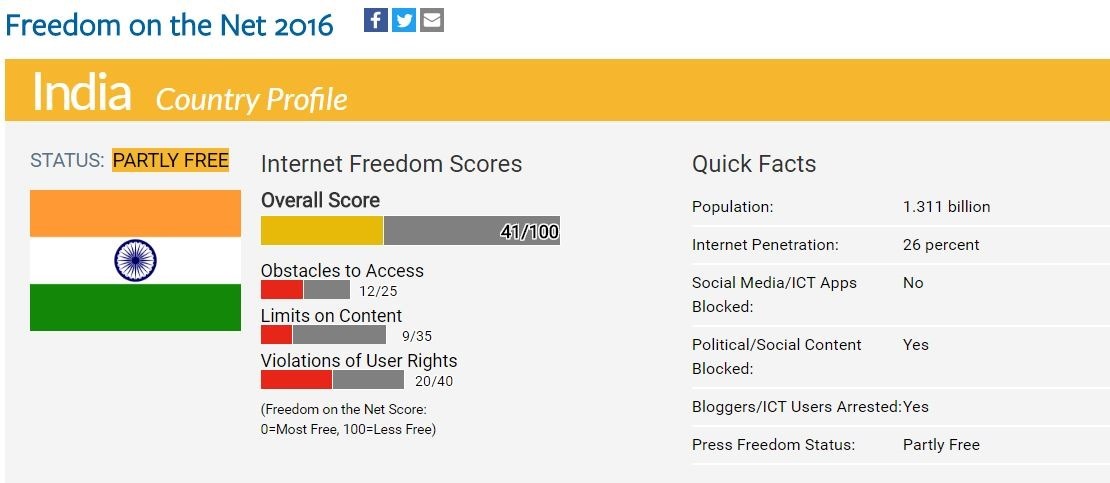India Scores a Poor 41/100 In Internet Freedom; Freedom Declines Despite Government Efforts

In August last year, Govt. ordered ISPs to block 857 porn website, which was described as ‘Talibanization’ of Internet, and a desperate move to cull the freedom of Internet users in India.
In 2014, 2341 URLs were blocked by Government of India, which was 73% more than previous year.
In September this year, Govt. planned massive surveillance of media as all negative news were being ordered to be removed.
In August this year, Govt. made its intentions clear when they announced Rs 3 lakh fine and 3 years in jail in case anyone is found to be viewing blocked URLs or using torrents in India.
Such hardcore anti-freedom actions are being monitored by various organizations and they are being added into the lists.
One such strategic think-tank from US, Freedom House, has just released a report on the freedom of Internet users in India, and the result is not encouraging. We have further slipped in the ranking as we scored measly 41/100, which has been described as ‘Partly Free’.
Although Govt. took some measures to protect the freedom of Internet users in India; for instance, scrapping of the draconian Section 66A of the Information Technology Act, 2000 which Supreme Court called as unconstitutional and against the freedom of speech by Indians.
Besides, TRAI protected the net neutrality fundamentals in India by stopping Facebook and Airtel to launch their plans which could have threatened the existence of fair Internet in India.
However, the efforts are not enough it seems.
The report said, “However, other developments undermined internet freedom. Local authorities ordered service providers to temporarily shut down internet access in at least 23 reported incidents in various states. In 2016, the Supreme Court dismissed a petition challenging the use of broad powers provided to state governments under the criminal procedure code to shut down internet services.”
The report also mentions removal of content by private players (or under pressure from Govt?) last year, which brought India’s score in Internet freedom down. For instance, In May, 2015, non-profit organization Sikhs For Justice stated that their Facebook page has been blocked; admins of “Indian Atheists,” and “Indian Atheists Debate corner” facebook pages reported that their pages were temporarily blocked; Fans of Facebook pages of The Wire and Faking News were not able to share the articles on Facebook for some weeks last year and so on.
The report cites Facebook’s own admission that they have received requests from the Govt. to remove more than 30,000 pieces of content; while Google received 259 such requests affecting 1606 items.
The report also mentions the challenges faced by Indian internet users, which are indirectly affecting their freedom: Factors such as connectivity, less penetration (only 26% as of December, 2015), low broadband speed and manipulation of data usage charges by the big telecom players.
When Freedom House interviewed social media users from India, then they found these major issues concerning the users:
- Online abuse, which affects almost half of all social media users in India
- 36% of the respondents faced online harassment and they took no action at all
- Respondents lost trust in several publications because of online harassment
- Blocking abusive social media users is not the solution to stop this practice
- 30% of the respondents were not even aware of the laws which can protect them from abusers
You can access the report here.
